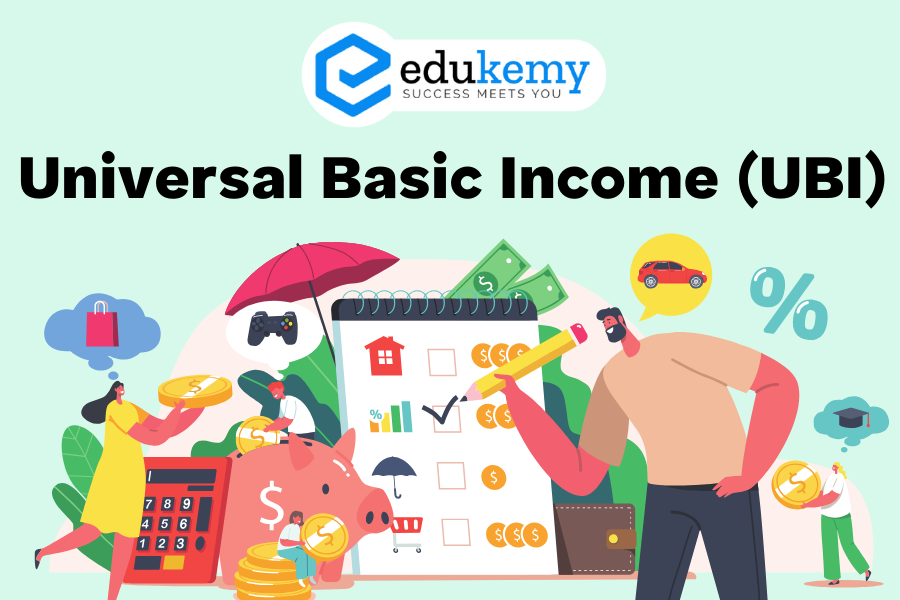
Universal Basic Income (UBI) is a social security model in which all citizens receive a regular, unconditional sum of money from their respective governments. The concept has gained prominence in global discussions, particularly in response to concerns about automation, job loss, and economic growth.
Contents
Debates and Considerations:
- Transparency:
- Advantages: UBI offers a simpler and more transparent welfare system compared to existing ones.
- Controversy: Some argue for UBI to complement existing welfare programs rather than replace them. Concerns about accessibility in remote areas and potential inflation.
- Administrative Efficiency:
- Benefits: UBI is expected to have lower overall costs and reduced leakages compared to the current welfare systems.
- Caution: Reversing UBI could lead to the absence of both the original welfare infrastructure and the basic income.
- Poverty Reduction:
- Advocacy: UBI is promoted for its potential to reduce or eradicate poverty.
- Contested Claims: Fiscal limitations and limited market penetration in countries like India raise doubts about the effectiveness of UBI in poverty reduction.
- Basic Income and Growth:
- Economic Growth: UBI proponents argue that it ensures demand due to transfers, stimulating economic growth.
- Debatable Impact: The sustainability of UBI and investor confidence depend on legislative backing and federal consensus. Concerns about reduced work leading to lower tax revenue.
- Freedom:
- Beneficiary Autonomy: UBI provides recipients the freedom to use the income as they see fit.
- Challenges: Critics express concerns about potential misuse, such as spending on alcohol and drugs. Debate on the impact of unconditional money on work motivation.
Conclusion: The concept of Universal Basic Income sparks debates on various fronts, from its potential to simplify welfare systems to concerns about economic impact, fiscal feasibility, and societal implications. As discussions continue, the idea remains at the intersection of economic, social, and political considerations.
FAQs
1. What is Universal Basic Income (UBI)?
- Answer: Universal Basic Income (UBI) is a social welfare program where all citizens or residents of a country regularly receive a fixed sum of money from the government, regardless of their income, employment status, or wealth. The aim is to provide a financial safety net to cover basic living expenses.
2. How is Universal Basic Income funded?
- Answer: Funding for Universal Basic Income can come from various sources, including taxation of income, wealth, or consumption. Some proposals suggest reallocating existing welfare funds, implementing a carbon tax, or levying taxes on automation and technology advancements.
3. What are the potential benefits of Universal Basic Income?
- Answer: Universal Basic Income has several potential benefits, including poverty reduction, economic security, and increased freedom for individuals to pursue education, entrepreneurship, or creative endeavors. It can also streamline bureaucratic welfare systems and reduce administrative costs.
4. What are the criticisms of Universal Basic Income?
- Answer: Critics argue that Universal Basic Income may disincentivize work, lead to inflation, or create dependency on government handouts. Concerns also exist regarding the affordability of implementing UBI on a large scale and its potential impact on government budgets.
5. Has Universal Basic Income been implemented anywhere?
- Answer: While there have been various pilot programs and experiments with Universal Basic Income in countries like Finland, Canada, and Kenya, no nation has fully implemented a nationwide UBI program. However, several regions and municipalities have implemented localized versions to test its feasibility and impact.
In case you still have your doubts, contact us on 9811333901.
For UPSC Prelims Resources, Click here
For Daily Updates and Study Material:
Join our Telegram Channel – Edukemy for IAS
- 1. Learn through Videos – here
- 2. Be Exam Ready by Practicing Daily MCQs – here
- 3. Daily Newsletter – Get all your Current Affairs Covered – here
- 4. Mains Answer Writing Practice – here

